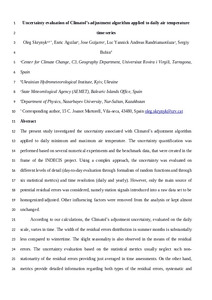Por favor, use este identificador para citar o enlazar este ítem:
http://hdl.handle.net/20.500.11765/12517
Uncertainty evaluation of Climatol’s adjustment algorithm applied to daily air temperature time series
| Título : | Uncertainty evaluation of Climatol’s adjustment algorithm applied to daily air temperature time series |
| Autor : | Skrynyk, Oleg; Aguilar, Enric; Guijarro Pastor, José Antonio


|
| Palabras clave : | Uncertainty; Homogenization adjustment; Climatol,; Minimum and maximum daily air temperature; INDECIS |
| Fecha de publicación : | 2020 |
| Editor: | Royal Meteorological Society; Wiley |
| Citación : | International Journal of Climatology. 2020 |
| Versión del editor: | https://dx.doi.org/10.1002/joc.6854 |
| Resumen : | The present study investigated the uncertainty associated with Climatol’s adjustment algorithm applied to daily minimum and maximum air temperature. The uncertainty quantification was performed based on several numerical experiments and the benchmark data, that were created in the frame of the INDECIS project. Using a complex approach, the uncertainty was evaluated on different levels of detail (day-to-day evaluation through formalism of random functions and through six statistical metrics) and time resolution (daily and yearly). However, only the main source of potential residual errors was considered, namely station signals introduced into a raw data set to be homogenized/adjusted. Other influencing factors were removed from the analysis or kept almost unchanged. According to our calculations, the Climatol’s adjustment uncertainty, evaluated on the daily scale, varies in time. The width of the residual errors distribution in summer months is substantially less compared to wintertime. The slight seasonality is also observed in the means of the residual errors. The uncertainty evaluation based on the statistical metrics usually neglect such nonstationarity of the residual errors providing just averaged in time assessments. On the other hand, metrics provide detailed information regarding both types of the residual errors, systematic and scatter. The metrics values showed good capability of the Climatol software to remove the systematic errors related to jumps in the means, while the scatter errors are removed from the raw time series with less efficiency. On yearly scale, the uncertainty evaluation was performed for yearly temperature data and several climate extreme indices. The both types of the errors are removed well in yearly time series of the air temperature and the extreme indices. The metrics values also showed significant reduction of the adjustment uncertainty of Climatol’s adjustment. Substantial decreasing of linear trend errors in yearly time series can also be reported. |
| Patrocinador: | The work was performed in the frame of the INDECIS project, that is a part of ERA4CS, an ERA-NET initiated by JPI Climate, and funded by FORMAS (SE), DLR (DE), BMWFW (AT), IFD (DK), MINECO (ES), ANR (FR) with co-funding by the European Union (Grant 690462). The work has been partially supported by the Ministry of Education and Science of Kazakhstan (Grant BR05236454) and Nazarbayev University (Grant 090118FD5345). |
| URI : | http://hdl.handle.net/20.500.11765/12517 |
| ISSN : | 0899-8418 1097-0088 |
| Colecciones: | Artículos científicos 2019-2022 |
Ficheros en este ítem:
| Fichero | Descripción | Tamaño | Formato | ||
|---|---|---|---|---|---|
| skrynykO20-pre.pdf | 3,51 MB | Adobe PDF |  Visualizar/Abrir |
Los ítems de Arcimis están protegidos por una Licencia Creative Commons, salvo que se indique lo contrario.





